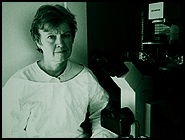Infertile Because of HIV
HARVARD UNIVERSITY RESEARCHER Ann Kiessling is creating a non-profit infertility treatment program, called the Assisted Reproduction Foundation, for couples like Barbara and Charley. Kiessling is a virologist and embryologist, and an associate professor of surgery at Harvard Medical School. She directed the laboratories at two Harvard-affiliated infertility clinics and studies the basic science of sexually transmitted diseases.
Kiessling considers a man with HIV infertile, even if there is otherwise
nothing wrong with his sperm.
"They can't conceive naturally without a real risk to the mother and the baby," Kiessling says. "That's never been part of the infertility definition, but in their day-to-day world, they're infertile."

|
Harvard University virologist Ann Kiessling in the mobile embryology lab.
|
There may be thousands of American couples in which the man is HIV-positive
and the woman is not. Scientists call them serodiscordant. Among
them are Harrison and Lilly, a couple from the Northeast who did not want to
give their real names because their families do not know that Harrison has
HIV. Both are in their thirties. They were married six years ago, and
Harrison tested positive for HIV shortly after.
"We always thought we'd have children," Lilly says with a sad smile. The HIV test changed all that. "We thought, 'That's it, we can't have kids. We just can't have kids.' And then we met Ann."
Harrison's health is relatively good because he takes
AIDS-suppressing drugs. That doesn't make the decision to have a child
simple. "There are a lot of issues we have to work through. Is it morally
reprehensible to have a baby if you're HIV positive?" Harrison asks rhetorically.
Lilly adds, "Knowing that one parent can die. A lot of people say, 'Anyone can lose a parent.' But they don't know that ahead of time. You don't know that going in."
If Lilly contracts HIV by getting pregnant, chances are high the baby would
get infected, too. HIV experts say infected American women have a 1-in-4 danger of transmitting the disease to their children. Studies show that anti-AIDS drugs can cut the risk to less than 10%, but that's still a relatively high figure. Medical ethicist Arthur Caplan of the University of Pennsylvania says the decision to conceive a child when the father has HIV should be made with utmost care.
"HIV being an illness that really causes a great deal of suffering and
misery to the person who is afflicted by it, there is a moral obligation to
think long and hard about whether or not you should try to parent," Caplan
says.
Next:
Washing Away the Virus
HIV and Fertility home
|